Abgent Pathway Resource
The Abgent Biological Pathway Collection
The Abgent biological pathway collection presents critical protein networks involved in cellular health and disease. Concise descriptions of essential pathways accompany interactive maps illustrating key interactions driving signaling and function. To select the right tool for your research, click on protein icons in the maps to view target-specific antibody products, produced by Abgent.
Abgent is an original manufacturer of antibodies focused on targets covering the major research areas impacting health and disease, including cancer, metabolism, neuroscience, cardiovascular, immunology, and stem cells.
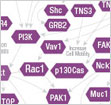
Her/ErbB receptor tyrosine kinases are activated upon ligand binding and dimerization. They signal through Akt, MAPK, and other pathways to regulate proliferation, differentiation, apoptosis, migration, and motility ...
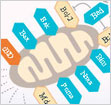
The mammalian target of rapamycin (mTOR) signaling pathway integrates intracellular and extracellular signals to regulate cell metabolism, growth, proliferation and survival...
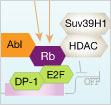
Cell cycle arrest provides time crucial for repair of DNA damage, preserving genomic integrity. Growth arrest activates through checkpoint pathways that delay cell cycle progression ...
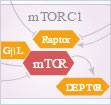
The mammalian target of rapamycin (mTOR) signaling pathway integrates intracellular and extracellular signals to regulate cell metabolism, growth, proliferation and survival...
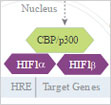
Angiogenesis is the process of creating new blood vessels from preexisting blood vessels. This process is essential for healing, growth, development...
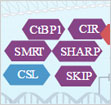
The Notch signaling pathway is an evolutionarily conserved pathway operating in multicellular organisms. This pathway plays a significant role in cell differentiation during embryonic development and maintenance of adult tissue homeostasis...
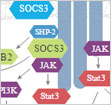
The Janus kinase/signal transducers and activators of transcription (JAK/STAT) pathway cascades to transduce cellular signals for development and homeostasis...
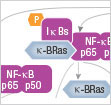
Nuclear factor-kB (NF-kB)/Rel proteins control genes involved in inflammation, innate and adaptive immunity, B-cell development inflammation, and stress responses...














 Foundational characteristics of cancer include proliferation, angiogenesis, migration, evasion of apoptosis, and cellular immortality. Find key markers for these cellular processes and antibodies to detect them.
Foundational characteristics of cancer include proliferation, angiogenesis, migration, evasion of apoptosis, and cellular immortality. Find key markers for these cellular processes and antibodies to detect them. The SUMOplot™ Analysis Program predicts and scores sumoylation sites in your protein. SUMOylation is a post-translational modification involved in various cellular processes, such as nuclear-cytosolic transport, transcriptional regulation, apoptosis, protein stability, response to stress, and progression through the cell cycle.
The SUMOplot™ Analysis Program predicts and scores sumoylation sites in your protein. SUMOylation is a post-translational modification involved in various cellular processes, such as nuclear-cytosolic transport, transcriptional regulation, apoptosis, protein stability, response to stress, and progression through the cell cycle. The Autophagy Receptor Motif Plotter predicts and scores autophagy receptor binding sites in your protein. Identifying proteins connected to this pathway is critical to understanding the role of autophagy in physiological as well as pathological processes such as development, differentiation, neurodegenerative diseases, stress, infection, and cancer.
The Autophagy Receptor Motif Plotter predicts and scores autophagy receptor binding sites in your protein. Identifying proteins connected to this pathway is critical to understanding the role of autophagy in physiological as well as pathological processes such as development, differentiation, neurodegenerative diseases, stress, infection, and cancer.
